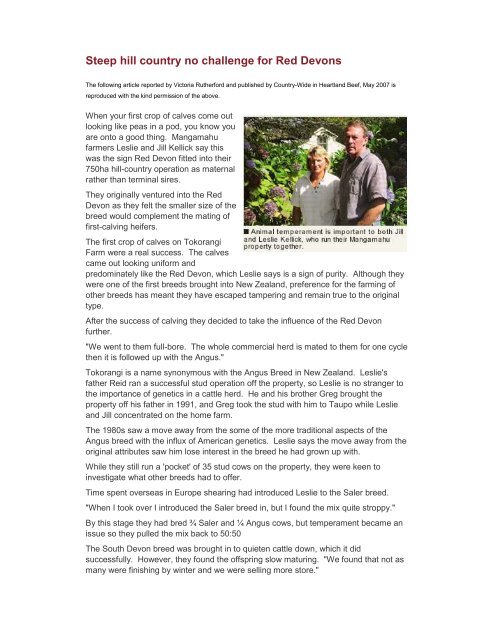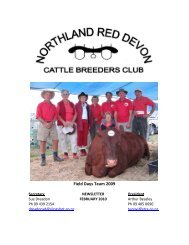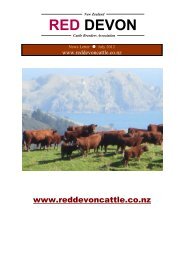Steep hill country no challenge for Red Devons - New Zealand Red ...
Steep hill country no challenge for Red Devons - New Zealand Red ...
Steep hill country no challenge for Red Devons - New Zealand Red ...
You also want an ePaper? Increase the reach of your titles
YUMPU automatically turns print PDFs into web optimized ePapers that Google loves.
<strong>Steep</strong> <strong>hill</strong> <strong>country</strong> <strong>no</strong> <strong>challenge</strong> <strong>for</strong> <strong>Red</strong> <strong>Devons</strong><br />
The following article reported by Victoria Ruther<strong>for</strong>d and published by Country-Wide in Heartland Beef, May 2007 is<br />
reproduced with the kind permission of the above.<br />
When your first crop of calves come out<br />
looking like peas in a pod, you k<strong>no</strong>w you<br />
are onto a good thing. Mangamahu<br />
farmers Leslie and Jill Kellick say this<br />
was the sign <strong>Red</strong> Devon fitted into their<br />
750ha <strong>hill</strong>-<strong>country</strong> operation as maternal<br />
rather than terminal sires.<br />
They originally ventured into the <strong>Red</strong><br />
Devon as they felt the smaller size of the<br />
breed would complement the mating of<br />
first-calving heifers.<br />
The first crop of calves on Tokorangi<br />
Farm were a real success. The calves<br />
came out looking uni<strong>for</strong>m and<br />
predominately like the <strong>Red</strong> Devon, which Leslie says is a sign of purity. Although they<br />
were one of the first breeds brought into <strong>New</strong> <strong>Zealand</strong>, preference <strong>for</strong> the farming of<br />
other breeds has meant they have escaped tampering and remain true to the original<br />
type.<br />
After the success of calving they decided to take the influence of the <strong>Red</strong> Devon<br />
further.<br />
"We went to them full-bore. The whole commercial herd is mated to them <strong>for</strong> one cycle<br />
then it is followed up with the Angus."<br />
Tokorangi is a name sy<strong>no</strong>nymous with the Angus Breed in <strong>New</strong> <strong>Zealand</strong>. Leslie's<br />
father Reid ran a successful stud operation off the property, so Leslie is <strong>no</strong> stranger to<br />
the importance of genetics in a cattle herd. He and his brother Greg brought the<br />
property off his father in 1991, and Greg took the stud with him to Taupo while Leslie<br />
and Jill concentrated on the home farm.<br />
The 1980s saw a move away from the some of the more traditional aspects of the<br />
Angus breed with the influx of American genetics. Leslie says the move away from the<br />
original attributes saw him lose interest in the breed he had grown up with.<br />
While they still run a 'pocket' of 35 stud cows on the property, they were keen to<br />
investigate what other breeds had to offer.<br />
Time spent overseas in Europe shearing had introduced Leslie to the Saler breed.<br />
"When I took over I introduced the Saler breed in, but I found the mix quite stroppy."<br />
By this stage they had bred ¾ Saler and ¼ Angus cows, but temperament became an<br />
issue so they pulled the mix back to 50:50<br />
The South Devon breed was brought in to quieten cattle down, which it did<br />
successfully. However, they found the offspring slow maturing. "We found that <strong>no</strong>t as<br />
many were finishing by winter and we were selling more store."
Enter the <strong>Red</strong> Devon, which Leslie stresses is an entirely different breed to the South<br />
Devon. They had the temperament needed on the property as well being earlier<br />
maturing. The smaller cattle (550kg<br />
cow average compared with the 600kg<br />
Angus) were also easier on the fragile<br />
sandy <strong>hill</strong> <strong>country</strong> soils.<br />
Temperament a vital part<br />
They 'flourished' on the marginal <strong>hill</strong><br />
<strong>country</strong>, where Leslie felt the South<br />
Devon had been limited by the amount<br />
and quality of feed.<br />
"If you can feed and winter (the South<br />
Devon) well, they are fantastic, but<br />
these <strong>hill</strong>s aren't as good as other <strong>hill</strong><br />
<strong>country</strong> around. Compared with places<br />
like Gisborne, it doesn't rate."<br />
The property has an annual rainfall of 1250mm and ranges from 46-366m a.s.l. Threequarters<br />
of the farm is steep <strong>hill</strong> <strong>country</strong>, and the 132ha of flats, which lie along the<br />
banks of the Whangaehu River, are used mostly <strong>for</strong> lamb and cattle finishing.<br />
The sandy soils are good in winter with their free-draining properties, but the<br />
easterly/westerly facing <strong>country</strong> is prone to drying-off in the summer. They have<br />
experienced some tough times on the property, with the scars from the 2004 floods still<br />
visible over much of the <strong>hill</strong> <strong>country</strong>'s upper reaches. The mud from the recent lahar<br />
lines the banks of the Whangaehu, but<br />
according to Leslie, it was <strong>no</strong>-where<br />
near the magnitude of 2004, or carried<br />
the acidity of the 1995-96 Ruapehu<br />
eruptions.<br />
Despite this, Leslie says they have a<br />
good climate. However, the<br />
environment the cattle are brought up in<br />
is still very important to them when<br />
selecting a sire.<br />
He has recently bought his <strong>Red</strong> Devon<br />
bulls from Te Maewa Stud, near<br />
Pahiatua. The property, owned by<br />
Graeme Dyke, is subject to strong winds and an exposed climate.<br />
When they visited the property in September they saw all the stock in their natural<br />
environment, including the bulls that were at the time behind a wire. Seeing how the<br />
stock handled that environment assured Leslie the cattle would slot into their <strong>country</strong><br />
easily.<br />
"It was good to see the cattle exactly as they are. They were being farmed in a<br />
commercial sense without a lot of gloss, and they carried that on to our property."<br />
The faster growth and early maturing of the <strong>Red</strong> Devon has meant they are able to get<br />
stock off the farm be<strong>for</strong>e a second winter.
"The faster growth is really beneficial with the weaners. They are <strong>no</strong>t going to kill at<br />
massive weights, but they are big e<strong>no</strong>ugh."<br />
But what really stands out is the temperament of the breed. Having been used to<br />
Angus bulls fighting amongst themselves, he was amazed to see how laid-back they<br />
were.<br />
"They mix in with the others and don't seem to fight like the Angus. They came back<br />
from the cows very quiet."<br />
The Kellicks are also enjoying the change away from farming bull beef. Up until two<br />
years ago they farmed bulls on the property, but Leslie says they had an ongoing<br />
problem with the bulls firing up with every whiff of the cow herd.<br />
"I feel you really need a specific bull farm. They were shorting out fences and wrecking<br />
gates.<br />
"Even the Frisians were getting upset, and when they don't eat, they go down<strong>hill</strong><br />
quickly."<br />
Jill says it got to the point where she wasn't keen to get in the yards with them. Leslie<br />
and Jill run the farm by themselves and can't af<strong>for</strong>d to get hurt, so they reviewed their<br />
stock policy and moved to farming steers and heifers <strong>for</strong> the markets.<br />
"It was a management decision. We run it together with <strong>no</strong> labour and we want a laidback<br />
lifestyle with <strong>no</strong> injuries."<br />
Their daughter Lucy came back to help on the farm four eight months but has <strong>no</strong>w<br />
gone to do vet nursing. The couple's other daughter Kate is doing an automotive<br />
engineering course in Palmerston North.<br />
Leslie is confident about the future of the <strong>Red</strong> Devon on their property. He says he has<br />
seen e<strong>no</strong>ugh from the cattle to k<strong>no</strong>w they have done the right thing.<br />
"The <strong>Red</strong> <strong>Devons</strong> work well in the environment and I believe they are going to do it <strong>for</strong><br />
us."




